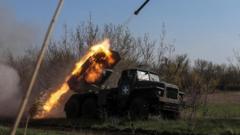Latvia's recent parliamentary vote to withdraw from an international convention against anti-personnel mines marks a significant shift in military policy driven by heightened fears of Russian aggression and strategic realities in Eastern Europe.
**Latvia Leads Baltic Nations in Exiting Anti-Personnel Mine Treaty Amid Rising Security Concerns**

**Latvia Leads Baltic Nations in Exiting Anti-Personnel Mine Treaty Amid Rising Security Concerns**
Latvia's government takes a bold step alongside Baltic neighbors and Poland to abandon the 1997 Ottawa Treaty due to increased threats from Russia.
Latvia's Parliament has officially voted to withdraw from the Ottawa Treaty, an international agreement banning anti-personnel mines, citing growing concerns over Russian aggression, particularly following the invasion of Ukraine. This move positions Latvia as the first among Eastern European nations to initiate a pull-back from the treaty, part of a broader agreement with its Baltic neighbors and Poland reached last month.
The situation escalated after defense ministers from Latvia, Lithuania, Estonia, and Poland convened in March and recognized a significant increase in military threats from Russia and Belarus to NATO member states in their vicinity. Latvia's decision is indicative of a growing trend, as Finland has also expressed intent to exit the treaty.
The withdrawal from the Ottawa Treaty, which was established in 1997 to curtail the use and proliferation of anti-personnel mines, is likely to create a ripple effect across Eastern Europe. Observe that this treaty was once seen as a beacon of hope for global disarmament after the Cold War; however, tensions have drastically renewed with the ongoing conflict in Ukraine.
Lithuania has emerged as a vocal proponent of leaving the treaty, driven by anxiety about its own defense, particularly after a fact-finding visit to Ukraine's border. The potential mass departure of these countries from the convention raises alarm over the re-emergence of land mines and other explosive threats, exacerbating civilian dangers in regions already experiencing conflict.
The implications of this decision extend beyond immediate military readiness; it reflects deepening worries over regional security dynamics and a potential shift in how nations may prioritize military preparedness over international disarmament agreements in the face of evolving threats.






















